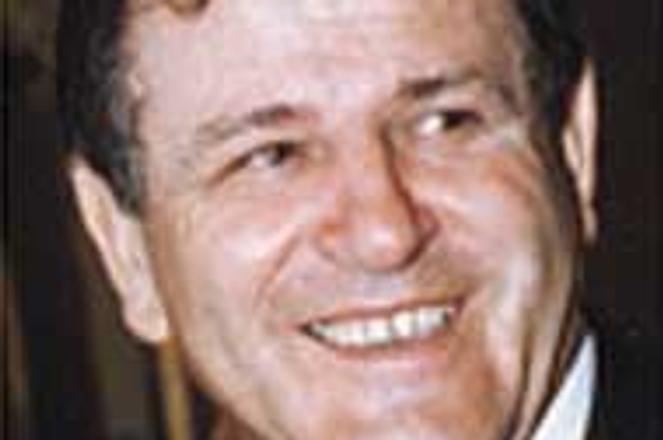May 29 presidential elections pitted former Slovak Prime Minister Vladimír Mečiar (left) against Košice mayor Rudolf Schuster.photo: Vladimír Hák - Profit
What the second round of Slovakia's presidential campaign lacked in spark it more than made up for in bizarre twists. The two finalists for the May 29 runoff presidential ballot, Košice mayor Rudolf Schuster and former Slovak Prime Minister Vladimír Mečiar, eschewed direct debate, big rallies and hard campaigning - only to be waylaid by an assasination threat, a court case and libellous billboards.
"It wasn't a real campaign," said Ľuboš Kubín, a political scientist with the Slovak Academy of Science. "It lacked the spark of the first round, when there were ten different candidates competing with each other."
Indeed, Mečiar and Schuster were almost invisible in the two weeks following the first round of voting on May 15, holding only a few small rallies and foregoing electronic media advertising.
"The candidates brought no new issues before the public," said Kubín. "Their candidacies were all about their past political activities."
Despite the best attempts of the two candidates to maintain low profiles, however, a series of bizarre events kept them in the public spotlight.
Schuster, who was a senior functionary in the communist party before 1989 and was the chairman of the last communist parliament, was caught in a blaze of publicity on May 20 after a little-known terrorist group calling itself "Revenge" sent him a letter threatening him with assassination if he stayed in the presidential contest.
In the letter, the would-be assassins said they "were, are and will be" communists, and claimed that Schuster had betrayed communist principles after 1989.
The Slovak Communist Party immediately distanced itself from the Revenge group, saying that none of its regular members would think of associating with terrorists.
Ján Bílek, Schuster's campaign manager, said that his candidate had actually received four such letters. "Some people may benefit from such activities, but this group is very small. We have turned the matter over to the police, and there's nothing else we can do."
Schuster was the object of more unwelcome publicity when he announced at a May 19 press conference that he would not meet Mečiar in a scheduled open debate on state television (STV). He explained that the debate would only "deepen confrontation and further polarise society."
In the face of Schuster's refusal to meet Mečiar on live television, STV was forced to change the format of the pre-election debate. Instead of a face-to-face meeting, STV decided to give each candidate a certain amount of time alone to answer questions they had picked before the programme.
Mečiar's Movement for a Democratic Slovakia (HZDS) party then accused STV management of wrongdoing in their efforts to meet Schuster's conditions. "We [HZDS] would like to point out the fact that perhaps the [election] law was violated," Marián Kardoš, the party's spokesperson, told The Slovak Spectator. "We think that the way in which the debates were changed was wrong, and we're using our right to point that out."
He added that HZDS legal experts were analysing the changes made to the television debates. "We'll wait to see what the lawyers say and then decide how to react," Kardoš said.
Jozef Filo, Slovak Television Programme Director, denied the allegations of manipulation and said that the new format was the only way to get both candidates to speak on camera. " Slovak Television followed the law," he told the SITA news agency, adding that the change was okayed by the station's advisory bureau, the Slovak Television Council.
Prime Minister Mikuláš Dzurinda stood firm behind Schuster, who has the support of the ruling coalition, and said he understood Schuster's decision not to meet Mečiar.
"There has been enough bickering in Slovakia already," Dzurinda said at a May 24 press conference.
The issue, however, got full play in the opposition press when on May 22 the daily paper Slovenská Republika ran a full-page advertisement bearing the slogan "Why is Schuster scared of a dialogue with Mečiar?" Kardoš said that the HZDS did not stand behind the paper's initiative. "This paper's opinions are just close to the HZDS, but we [HZDS] don't intervene to influence its content," he said.
Beset by assassins and pilloried for his refusal to meet Mečiar, Schuster became the object of a lawsuit. On May 25, a citizen by the name of Rastislav Tešovič initiated legal proceedings against Schuster, claiming that the presidential candidate had uttered several statements in which he openly supported movements which violated human rights and freedoms. In the same lawsuit, Tešovič also filed charges against Schuster for allaged communist propaganda that the Košice mayor had uttered on a May 10 discussion panel on the private Markíza television channel.
The SITA news agency reported the same day that police were investigating the charges.
Finally, in the closing days of the campaign, a series of billboards sprang up across Slovakia slamming both candidates.
Eighty billboards and 30,000 stickers attacking Mečiar and sponsored by the Young Civic Democrats (ODM, a group close to the SDK ruling party) appeared on May 25 in cities across the country. The stickers read "Thanks for not voting Mečiar" while the billboards bore the caption "If 'Len on' ['Only him,' an ironic reference to Mečiar] wins the second round of presidential elections, we ask the last citizen leaving Slovakia to turn the lights off."
Another series of billboards, sponsored by an anonymous donor, bore the legend "Lenin's descendants would vote for Schuster. And you?"
But for all the libellous tactics and the strange twists, analysts said the campaign had had little effect on voter preferences. "The scandals have not remarkably changed public opinion," said Kubín. "In the absence of any real issues, people have not changed their minds about who they will vote for."
Note: Under Slovakia's election laws, it is forbidden to publish the results of polls or material favoring any particular candidate within 48 hours of the vote.


